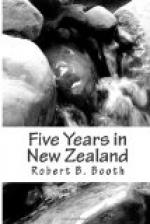Our last stage the following day was for the greater part by one of the most picturesque valleys I had yet seen. Mr. McLean had made a very fair road from the Lindis Pass boundary to his home station, which latter was only some five miles from the diggings, so it was very different travelling to what we had experienced on the other side. The track first wound along a deep ravine with rugged precipitous sides, mostly clothed with evergreen underwood from which huge masses of rock would now and then emerge, and sometimes overhanging a rushing torrent which had been swelled by the recent heavy rains and thus enhanced the effect on this glorious sunny morning. The waterfalls and cascades sparkled in a hundred colours, wheeling, foaming, and dashing in a mad race amidst huge rocks, till lost in shadow beneath a precipice or overhanging mass of variegated bush. The gorge then opened out into a level amphitheatre, with the river, grown calm and broad, winding peacefully, and surrounded by the mountains in all their enchanting shades of colour, and the distant peaks capped with snow.
Then another gorge of more imposing grandeur with a magnificent view beyond and through it, closed in turn by a sombre pine forest swept by the river, now grown larger and deeper, dancing and racing like a living thing in the brilliant sunshine and rare atmosphere of a New Zealand morning.
How well I remember the whole trip with all its roughness and all its beauty, its very contrasts no doubt helping to impress it upon the memory. Such scenes and incidents are difficult to forget, even if one would, and each and all are as distinct to my mind in almost every detail at this moment as if I had been with them only yesterday, instead of more than forty years ago.
CHAPTER XII.
LIFE ON THE GOLD DIGGINGS.
And now I will endeavour to picture my impression of the gold diggings as they appeared on that same evening.
After passing through one of the most beautiful of the Lindis gorges we found ourselves at the entrance of a wide tract of open and undulating country, almost bare of anything beyond short yellow grass, encompassed on all sides by hills which stretched away westward to the snow-crowned mountains. The extent of the open was from one to two miles square, and through its centre—or nearly so—the Lindis flowed in a rocky bed. Along the river and far up the downs on either side were sprinkled hundreds of little tents with their hundreds of fires and rising eddies of smoke. The banks of the river were crowded with men at work, some in the water, some out, others pitching tents or tending horses, some constructing rough furniture, cradles and long Toms for washing gold, hundreds of horses tethered among the tents or upon the open, and above all the suppressed hum of a busy multitude.




